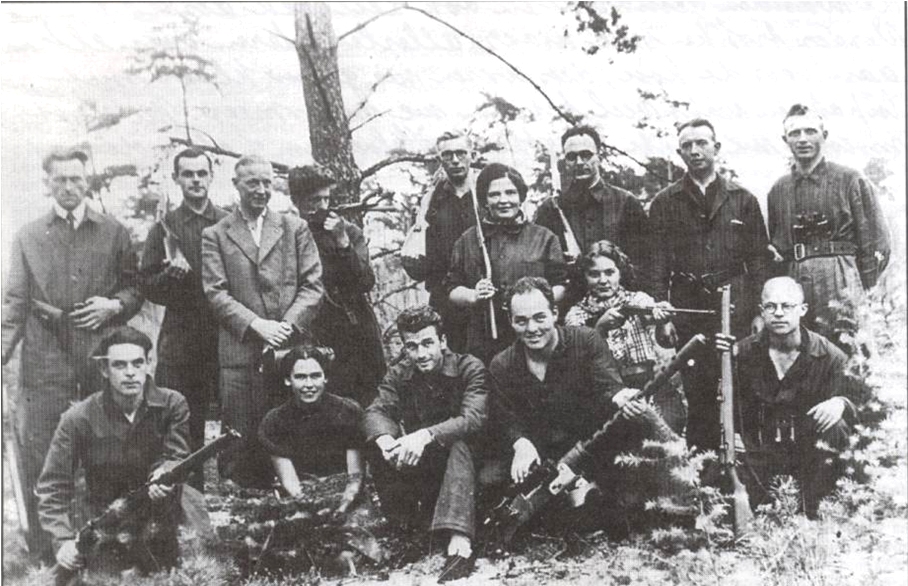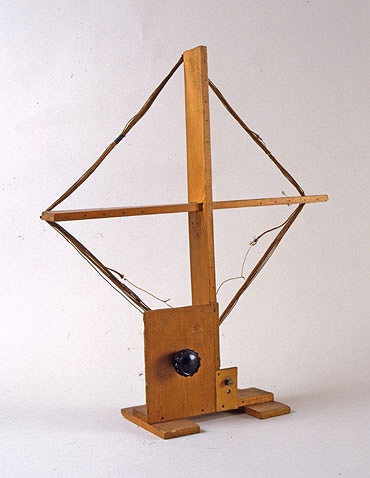

 Wikipedia Sitemap |
|
|  Useful Links 1 Useful Links 2 |
The Dutch Resistance, called in our land: "TAR UNDER GROUND" was a formidable organization. I never knew how well it was run until after the war. I started to realize actually a couple of months before that.
Everyone heard about it via the grape vine but very seldom was someone caught by the enemy. They would be shot by the Germans who would then show the people: "This is what happens to you if you sabotage the good cause."
I believe the big secret was that you joined, not for glory and fame, but because in your heart you wanted to do what you could to help to get rid of your oppressor. So you were not interested in who was who and did not ask questions like: "Who are you? Who gave you the authority?"
If someone said his name was Sam, he was known by that name only to one or two other people - the rest was mystery and stayed that way. My good friend Tim, for instance, was a courier, which I did not know for a long time. I became suspicious because he was always taking off on his bike going somewhere.
We worked together at the time, making wind mills for electricity and bicycle tires, etc. When I confronted him with what I knew, he admitted he picked up messages somewhere and handed them over to a girl he met on a bridge, acting a bit like lovers, in case someone was watching.
I became involved because of farmer Jan de Groot. One man went there to get grub for the underground. When Jan was satisfied he did work for them, he sent him over to recruit me. We had a long talk about things that were important to me and to him. I also became convinced he was what he pretended to be, so I said okay. Whatever had to be done, I was game.
The name he carried was "Blonde Jaap". From then on, he was the only person I came in contact with. He brought messages about what had to be done. I told him what I knew that could be important. He brought tire and truck bombs. He would supply me with a hand gun when it was necessary.
He supplied me with a new identification card, stating that I was infected with an incurable disease and could not be detained. Stamped and signed by the "ORTS KOMMANDANTE". Blah, blah, blah. Ha, ha, ha. Even if they had caught me after curfew, I felt very safe with this kind of papers.
Someone needed to steal a load of oats from the Germans, which was stored in a warehouse in the city. Jaap told me to go to a certain address, pick up horse and wagon, take it over to the place. There would be people to load it and further instruction would be forthcoming.
I was wondering, "Whose horse and wagon? And how about the civilian watchman?" This was my first big robbery. I was kind of apprehensive.
When I got there, a German officer was waiting. It scared the daylights out of me. Was it a trap? He must have seen my hesitation because he spoke in pure Dutch, with no accent. "I'm gonna ride with you just in case."
Well, he also spoke fluent Deutsh and would be responsible for our actions. Fine, I liked that.
This wagon had steel rims and was very noisy on the brick and cobble streets. The warehouse had two big doors and were locked. The underground had oiled the hinges days before so as not to make screeching noises, and they also had a key.
One man with a revolver went to see the watchman and made sure he stayed were he was. However, the key did not fit. Did they switch locks? Very likely. Now they had to take the big hinges off which would take some time and would make noise.
With the pseudo officer beside me, we drove back and forth in front of the building to cover up the racket those boys made.
Once in a while, he hollered a loud command in German to silence anyone who might be watching from behind curtains or any place else.
With the doors finally open, I backed the wagon in. Several men went to work and in no time, I was loaded.
Off we went to an inconspicuous house, one among a row. We had to carry every bag, 50 kg each, through the front door and into the kitchen.
The job done, I went home to sleep. What happened to the guard afterwards I never found out.
Jaap came over one day and said, "I got you a name, which I give to my contact. It is ETOS." What kind of name was that? It represented the first letters of "Een tijger op sokken", meaning: "A tiger on socks." Well, thank you. I thought it might mean something unusual.
Some jobs consisted of taking the bolts out of rails. If a train did come it would not go far beyond the spot. The rails separate and that was the end of the trip until it was fixed and the train put back on the tracks.
The Germans did not appreciate that a bit, so they assigned civilians to patrol the tracks and report trouble. Them guys did get good exercise but it did the enemy no good.
When the underground knew that a certain train carried stuff that should not be transported, the man that patrolled this track was advised to take his family and disappear, otherwise the enemy would get him. He did not have to be told what would happen if he ignored the warning.
When I had no orders from the underground for special assignment, I kept myself busy harassing the movement of troops. I asked Jaap for bombs. He kept bringing me boxes with tire explosives. They came from England and had been dropped off by parachutes.
I would then go out at night - preferably to the highway, a spot with very few houses. I would wait until a truck or other army units were coming, then carefully plant one or two bombs, the size of a shoe polish box, in where the wheels should run over it.
Then I would get out of the way and wait. This was the moments I really enjoyed. There were different reactions but the most fun was when the tire blew on single trucks loaded with troops. They felt it was sabotage, most did not stop at all. They screamed to keep going. Wop, wop, wop! What a beautiful sound. Others screamed and shot their rifles, but it was always pitch dark when I went out, so they could see no target and had no hope of hitting anything.
During the daylight hours, them soldiers acted like the masters of the world, which Hitler had taught them to be. But at night, without the backing of men with guns, I am sure many wet their pants. The screaming and shooting off of their guns did not get them out of those situations.
At Jan de Groot's place was a boy by the name of Kees, who escaped when he was forced to work for the Germans. He asked me one time if he could come along on one of my nightly raids. I agreed.
So one dark night, we set out across water filled ditches, ploughed fields, barb wire fences and the railway tracks to the highway where the army travelled a lot.
We came to a sideroad lined with big oak trees. Here, we waited until we could hear one or more trucks approaching. I planted a tire bomb on the pavement, then we retreated four or five trees and crunched behind one to find out what would happen.
It was only one truck. When it came to the right spot, BANG! BANG! Bull's eye. An awful howl filled the night, the truck stopped dead, then the crack of rifle fire rang out.
Kees jumped up and started to run. This was the fastest tackle in my life. I knocked him down and dragged him behind the next oak tree and kept him down.
In the mean time, the spent bullets came rattling down the tiled roofs of the houses down the street. But seeing no enemies that they could fire on, they sped away with their flat tires.
Needless to say, this was the first but also the last trip for the boy next door.
Related resources:

Former SS member faces trial for war crimes in the Netherlands by Elisabeth Zimmermann. "Almost 59 years after the death of Dutch resistance fighter Jan Houtman, the trial of 88-year-old former Nazi SS (Schutzstaffel) member Herbertus Bikker opened on September 8, 2003, in the German district court of Hagen. Bikker is accused of shooting the 27-year-old Houtman to death on November 17, 1944, on a farm in the Netherlands district of Dalfsen ...
The camp in Ommen was then functioning as a work camp for 'economic felons.' Economic offences included refusing to work, as well as industrial sabotage or even pilfering food. Cases dealing with transgressions of this kind rose from 21,000 (1941) to 120,000 (1943) ...
'Economic and social pauperisation increased the willingness of many Dutch people to participate in some form of resistance to the occupation. The actions of the underground resistance organisations became more effective and began to affect the German authorities and their Dutch contacts with some severity. Police and security services - and the Wehrmacht - responded with brutal reprisals, even against non-participants and innocent people. Terror had been elevated into the supreme necessity and instrument of power.'
For example, in retaliation for an attack by a Netherlands resistance fighter on a German officer, Christiansen, the commanding officer of the military, razed to the ground the village of Putten in the province of Gelderland am Westrand der Veluwe, ordered the immediate shooting of seven of its inhabitants, and deported 660 to the concentration camp of Amersfoort and then to Neuengamme concentration camp; only 116 survived ..."
The Dutch Resistance Museum (Verzetsmuseum), chosen as the best historical museum of the Netherlands, tells the story of the Dutch people in World War II. How did Dutch people respond to the Nazi occupation? Who resisted? Why, and how? You'll see, hear en read fascinating stories about the exceptional, as well as about everyday life. Kraut Sieve. "A 'kraut sieve' was a home-made indoor antenna intended to reduce the effect of German jamming stations ... For real news people secretly listened to the BBC and Radio Orange, the Dutch government station in London."

Dutch resistance from Wikipedia. "Dutch resistance to the Nazi occupation of the Netherlands during World War II can be mainly characterized by its prominent non-violence, summitting in over 300,000 people in hiding in the autumn of 1944, tended to by some 60,000 to 200,000 illegal landlords and caretakers and tolerated knowingly by some 1 million people, including German occupiers and military.
Dutch resistance developed relatively slowly, but the event of the February strike and its cause, the random razzia and deportation of over 400 Jews, stimulated resistance greatly. The first to organize themselves were the Dutch communists, who set up a cell-system immediately ...."
Sabotage from Wikipedia. "Sabotage training for the Allies of World War II consisted of teaching would-be saboteurs the key components to working machinery on which to focus their destruction. Saboteurs learned hundreds of small tricks to cause the Germans big trouble. The cables in a telephone junction box ... could be jumbled to make the wrong connections when numbers were dialed. A few ounces of plastique, properly placed, could bring down a bridge, cave in a mine shaft, or collapse the roof of a railroad tunnel."
The Dutch Resistance and the OSS by Sewart Bentley. "Geography also slowed the growth of the Resistance. The lack of mountainous and forested terrain prevented the establishment of hiding areas for large groups of maquis. Moreover, the flat terrain, interdicted by many bodies of water, large and small, confined movement to the established railroads, road networks, and bridges. These were easily controlled by the Germans, who established checkpoints to curtail freedom of movement. Gasoline was scarce, and many Dutch used bicycles for transportation, sometimes riding on the rims because of a shortage of rubber for tires. On the other hand, the Germans were plagued by the Resistance's incessant sabotage of telephone lines and by damage to the railroads.
By the middle of 1944, there were four major Resistance organizations in Holland. They did not coordinate their activities unless help from one group to another was absolutely necessary; for the most part they did not answer to a central headquarters. They conducted their operations as they saw fit, and members of the groups often did not know which organization they were part of. Many did not learn the identity of their particular group until after the war."
Survival and Resistance: The Netherlands Under Nazi Occupation by Linda M. Woolf, Ph.D. "Underground cells were involved in the manufacture of false papers or acted as couriers of secret documents to countries outside of the Netherlands to assist Allied war efforts. It is estimated that over fifty to sixty thousand individuals were directly involved in underground activities with hundreds of thousands more offering assistance. More than ten thousand lost their lives as a direct result of their courageous efforts."

Brave Little Dutch Girl: Memories of a Small Child in Holland During the German Occupation 1940-45. Book review from Amazon.com. "The ‘brave little Dutch girl’ was Wilhelmina Harris's sister Dicky, who rode off on her bicycle and braved the bitterly cold weather to bring back what little food could be gleaned in the dark days of hunger, which were intentionally inflicted by the occupying German forces in Holland during the Second World War.
Through the eyes of Wilhelmina, the youngest daughter, we follow the lives of the van der Hoek family in Maassluis, a strategically placed town. The Dutch despised the Germans for their cruelty and arrogance, and three of her uncles who were sailors made for England to join the allied forces. Her father listened to news broadcasts from the BBC, which broadcast the Dutch Radio Oranje during the war, although all radios were strictly forbidden. This meant they could keep up with progress during the war and secretly inform others about it too.
Woven within the account the author relates details of what was happening throughout Holland and the terrible persecution of the Jews. There were also the many cases of bravery where the Dutch people, particularly farmers, would hide Jews and allied pilots.
The worst period was when operation Market Garden (A Bridge Too Far) failed and the people were deliberately starved by the Germans. They had no coal or wood, no electricity, water was rationed and there was no food. Thousands starved to death, and the first ever food-drops took place by the RAF and USA in 1945.
This account is not sad, but in its honesty it displays the resilience of the Dutch and the way they coped with terrible hardships."